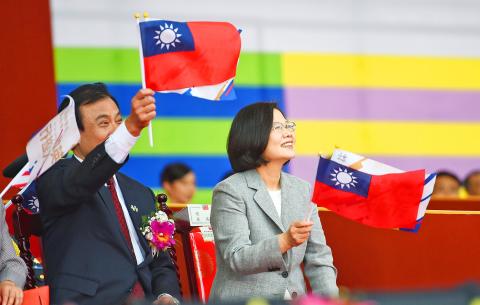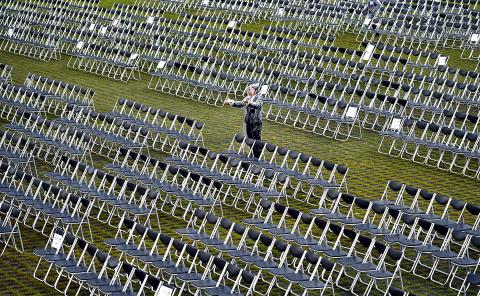President Tsai Ing-wen (蔡英文) in her Double Ten National Day speech yesterday called on China to act as a “responsible large nation” should — assuming a benign rather than quarrelsome role in the Asia-Pacific region and the world — as she vowed to maintain cross-strait peace and the democratic lifestyle of 23 million Taiwanese.
“Taiwan, at the forefront of the West Pacific, is under great pressure,” Tsai said.
China has in the past few years resorted to brow beating Taiwanese and restricting Taiwan’s international space, which has damaged cross-strait relations and is seriously challenging peace and stability across the Taiwan Strait, Tsai said.

Photo: Liu Hsin-de, Taipei Times
The redistribution of labor along the international supply chain, resulting from the US-China trade war, has disrupted international trade and increased the geopolitical complexity of the Indo-Pacific region, as well as cross-strait relations, the president said.
Some might demand a tougher stance from the government, while others wish for greater compromise, but Taiwan’s best course is to maintain stability in times of radical change, to face China’s pressure with equanimity and find a niche for survival, Tsai said.
This has been the government’s stance over the past two years, she said, adding that every responsible political figure and political party should resolve to uphold the greater consensus of the public.

Photo: Sam Yeh, AFP
The free and democratic way of life of 23 million Taiwanese — as well as efforts to ensure the sustainable development of the Republic of China, and maintain peace across the Strait and regional stability — must be continued, Tsai said.
“The government that I lead must show Taiwan’s toughness to the world,” especially when the world is overreacting to China’s rapidly expanding influence, she said.
Any unilateral attempt to change the “status quo” of cross-strait relations would never be accepted by Taiwanese, and any claim contravening universal values would never be recognized or supported by the international community, Tsai said.
Tsai guaranteed that Taiwan would not escalate tensions, but that the nation would not back down or compromise either.
“We will not move toward confrontation and conflict due to momentary passion, or move cross-strait relations toward danger — nor will we turn from the will of the people and sacrifice the sovereignty of Taiwan,” Tsai said.
Taiwan cannot afford miscalculations in times of such rapid change, she said.
“The solution is to maintain stability, remain flexible and seek advancement,” she said.
A strong nation is a prerequisite for any effective strategy, thus Taiwan must improve its national security and economic health, as well as a social safety net to make Taiwanese stronger, Tsai said.
The niche in which Taiwan can continue to survive is to become an even more indispensable member of the global community, she said.
The challenges that Taiwanese face are not limited to military threats, but also include diplomatic oppression, social infiltration and economic insecurity, she said.
The task at hand is to establish a comprehensive strategy and commence with efforts to strengthen national security, she said.
The first aspect of national security to be addressed is the strengthening of valuable diplomatic ties, and making the nation strategically invaluable, Tsai said.
During turbulent international developments, Taiwan — which is of great strategic importance geopolitically — must be resolute in its defense of democracy and the market economy, she said, adding that these things have served as the basis for Taiwan’s economic development and for the nation becoming a model of democratization in Asia, she said.
Facing pressure from China over the past two years, Taiwanese have demonstrated a high degree of resilience and determination in protecting their values, and like-minded nations have increasingly expressed their support, she said.
The second aspect to be addressed is the improvement of the nation’s defense capabilities, which involves a multi-tier approach, Tsai said.
Her stance has always been to steadily increase the defense budget each year, she said, adding that the military can satisfactorily defend the nation’s sovereign territory.
The third aspect is that the nation have a national security strategy capable of obstructing any attempt, foreign or domestic in origin, from destabilizing Taiwan’s economy, or its society, the president said.
Taiwan’s democracy must be defended at any cost — the government would not sit idly by if any country attempted to take advantage of that democracy to infiltrate and wreak havoc on Taiwanese society, she said.
Whether through the dissemination of disinformation, unauthorized acquisition of technology-related information, the compromising of information security systems or interference with the political system and elections, anyone proven to have committed such acts would be severely dealt with, she said.
The government has used international cooperation to counter the spreading of disinformation by parties in certain countries, she added.
Tsai said the lighthouse keepers, who were invited to sing the national anthem at yesterday’s ceremony, served as an analogy of Taiwan, which is like a beacon.
The nation’s democratization has been a light to outshine the darkness that Taiwanese had to pass through, and acts as a guide to all who seek democracies of their own, she said, adding that she hopes the people of Hong Kong and China be inspired by Taiwan.
“When the world sees Taiwan’s beauty, we will not be lonely,” she said.
“Taiwan will march bravely and resolutely forward. Taiwanese have always come together for the nation, deriving strength from unity,” Tsai said.

CHAOS: Iranians took to the streets playing celebratory music after reports of Khamenei’s death on Saturday, while mourners also gathered in Tehran yesterday Iranian Supreme Leader Ayatollah Ali Khamenei was killed in a major attack on Iran launched by Israel and the US, throwing the future of the Islamic republic into doubt and raising the risk of regional instability. Iranian state television and the state-run IRNA news agency announced the 86-year-old’s death early yesterday. US President Donald Trump said it gave Iranians their “greatest chance” to “take back” their country. The announcements came after a joint US and Israeli aerial bombardment that targeted Iranian military and governmental sites. Trump said the “heavy and pinpoint bombing” would continue through the week or as long

TRUST: The KMT said it respected the US’ timing and considerations, and hoped it would continue to honor its commitments to helping Taiwan bolster its defenses and deterrence US President Donald Trump is delaying a multibillion-dollar arms sale to Taiwan to ensure his visit to Beijing is successful, a New York Times report said. The weapons sales package has stalled in the US Department of State, the report said, citing US officials it did not identify. The White House has told agencies not to push forward ahead of Trump’s meeting with Chinese President Xi Jinping (習近平), it said. The two last month held a phone call to discuss trade and geopolitical flashpoints ahead of the summit. Xi raised the Taiwan issue and urged the US to handle arms sales to

State-run CPC Corp, Taiwan (CPC, 台灣中油) yesterday said that it had confirmed on Saturday night with its liquefied natural gas (LNG) and crude oil suppliers that shipments are proceeding as scheduled and that domestic supplies remain unaffected. The CPC yesterday announced the gasoline and diesel prices will rise by NT$0.2 and NT$0.4 per liter, respectively, starting Monday, citing Middle East tensions and blizzards in the eastern United States. CPC also iterated it has been reducing the proportion of crude oil imports from the Middle East and diversifying its supply sources in the past few years in response to geopolitical risks, expanding

An Emirates flight from Dubai arrived at Taiwan Taoyuan International Airport yesterday afternoon, the first service of the airline since the US and Israel launched strikes against Iran on Saturday. Flight EK366 took off from the United Arab Emirates (UAE) at 3:51am yesterday and landed at 4:02pm before taxiing to the airport’s D6 gate at Terminal 2 at 4:08pm, data from the airport and FlightAware, a global flight tracking site, showed. Of the 501 passengers on the flight, 275 were Taiwanese, including 96 group tour travelers, the data showed. Tourism Administration Deputy Director-General Huang He-ting (黃荷婷) greeted Taiwanese passengers at the airport and